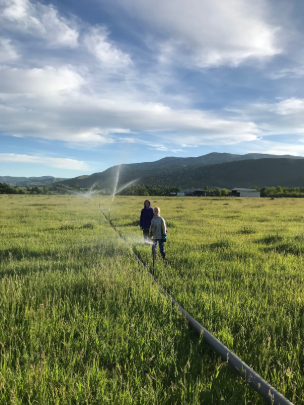By: Angie Hunter
 Every summer when I hear the “ch-ch-ch” of an irrigation handline turning out water that glistens brilliantly in the sun, I am reminded of my youth. I grew up on a farm which meant that there was always a built-in summer job. It may not have always been a paying one, unless you count my food and lodging, but I could never put a price tag on the perspectives I gained from those experiences.
Every summer when I hear the “ch-ch-ch” of an irrigation handline turning out water that glistens brilliantly in the sun, I am reminded of my youth. I grew up on a farm which meant that there was always a built-in summer job. It may not have always been a paying one, unless you count my food and lodging, but I could never put a price tag on the perspectives I gained from those experiences.
My dad would wake us up early to move irrigation hand-lines in fields of alfalfa and barley. I recall searching frantically for the right pair of matching boots as I had several siblings to contend with, all with varying sizes of feet. It was not uncommon to wear a pair that was either too small or too large, or even one of each, but if you didn’t want to get left, you made them work. Socks were equally important as a pair that slipped would surely result in an ugly blister.
At times it would be so chilly that there were tiny glass icicles poised perfectly upon plants the sprinkler pipes had been watering throughout the night. Other times my dad would let us sleep in a little longer which we usually regretted because then the heat would set in quicker, forming droplets of sweat that would run into my eyes and down my cheeks, as I did not have a free hand to wipe them until I had carried my pipe to its proper destination. The inability to use my hands became even more dire when there were mosquitoes present, which was pretty much always. This could result in a dropped pipe and some sort of psychotic slapping episode that may or may not end in a smeared red mark on my skin.
Despite the mosquito, boot, and climate woes, I learned priceless life-lessons in our field of dreams. In fact, in number I am up to around 25 lessons, but I will spare you the overwatering and share just a few. As you consider your summer courses or life in general, see if you can apply the following:
Be aware of your vantage point
When moving an irrigation line, it is critical that you get the line as straight as possible so that the field gets watered evenly. In order to achieve this, we would put a make-shift sign, perhaps an old raggedy red t-shirt wrapped around a fence post, or when being fancy, a painted piece of wood on a welded piece of metal that could be pushed into the ground. This sign gave us something to aim at. We would pride ourselves on making the line of pipe as straight as possible, and if someone’s pipe veered off in the wrong direction, you certainly heard about it.
Oddly enough when starting a new line, instead of aiming directly at the sign, my dad would find a landmark up on a distant hill and would have us line up with that instead. As we got some sprinkler pipe in place and had our line going in the direction of that landmark, then we would transition to aiming for the sign. My dad explained to us that when we were a long way from the end of the line, we had a different vantage point and needed to aim at something farther away. Otherwise, we would end up “way off” when we came to the end. In our attempts at aiming well, it was not uncommon for us to sing the chorus of the then catchy song “The Sign”, by Ace of Base as we made our way throughout the field. “I saw the sign, and it opened up my eyes, I saw the sign. Life is demanding without understanding…”
In our lives, we often create goals from off in the distance. We need to be able to shift our perspective along the way and particularly when the end is in sight. Are we on target, or do we need to shift to the left or right? We need to consider our vantage point. If we want the field to be watered evenly, we have to focus on consistency. Daily watering and even watering are important components. Do you do a little work daily in the summer on your courses or other chores? Do you balance your time so that each aspect of your life gets quenched? Do you overlap as needed to make sure that those thirsty areas get saturated? Or, do you just set out haphazardly lining up pipe only to discover a meandering snaking line that could have arrived at its destination much quicker if only there would have been a clear target?
Drain the line first, and team-up as necessary
When you first walk up to a pipe that has had water running through it all day and all night, you can usually tell by the lay of the land whether to expect an empty pipe that has drained properly or a pipe full of water that will be impossible to lift. The worst thing you can do for your back and the pipe is to try to lift it from the middle when it is full. This can result in a bent pipe or a back injury. It is always best practice to walk to the end that is most uphill and slowly pick up the pipe allowing it to drain completely. Sometimes the pipe can even fill up with mud or debris if the source is ditch water. Mud in a pipe makes it extremely awkward to carry and very lopsided. When you have a lot of pipe full of water or mud, it is wise to team-up and each take an end. One person drains, and when done, the other person picks up his or her end and the two carry the pipe together balanced and breathing easier.
Is your pipe full of water? Is there sludge and debris that need to be cleared out? When the weight of the world seems to fall upon our backs, don’t try to hoist it up all at once, or it just might come crashing back down on you. Instead, go to an end. Start small. Lift a little at a time. As the strain starts to drain, the load will lighten and your confidence will return. Reach out to a family member, a friend, a teacher, a mentor to get some support and help you balance the weight. Work smarter not harder.
Be mindful in the moment
As I reflect on those days in the field with my siblings and my dad, I never remember feeling anxiety, overwhelm, stress, fear, sadness, etc. (okay one time when my brothers were chasing me with a snake, I felt all of the above). Truly, though. We did not usually have a strict deadline. We just needed to work until the job was done. Sometimes we took it a little slower, enjoyed some conversation, savored the morning. Other times, we were wildly energetic and competitive and loved the challenge of pushing ourselves to get done as quickly as possible, or we would work to “beat someone” on another line of pipe to the finish. We took in all of the senses. The cold water seeping through our pants onto our thighs as the pipe naturally hit there as we walked, the squish of our boots in the mud sometimes getting so stuck we would literally walk right out of them, the mosquito buzzing in your ear bringing you almost to the brink of insanity, the green of the field and white spray of the water against a rising sun over the mountains in the east, the grunting and breathing that resulted as we did hard physical labor, the feeling of accomplishment when we had completed our work, and the sensation of that hot shower rinsing off the mud and grime of the morning.
We live in a world where the destination has become the focus. We are always looking ahead to the next “thing”. We think, “Once I get there, I will be happy.” We forget to enjoy the journey along the way. We lack presence in the moment. The goal should not just be “to get it done” but to get the most out of it while “the doing” is taking place. I’ve heard it said, “Be where your feet are”. Don’t let your mind wander to future unknowns and rob you of that moment’s joy. Find the joy in the study, the progress, even the failures that cause us to grow.
You better believe that I will be looking for “fields of opportunity” where my children can learn life lessons that will stick with them as these lessons have so profoundly impacted me.



